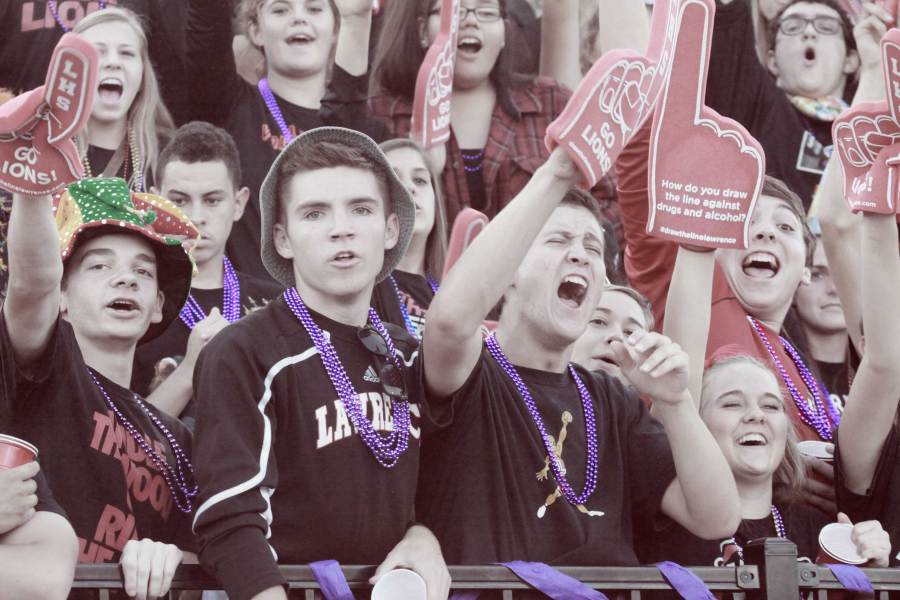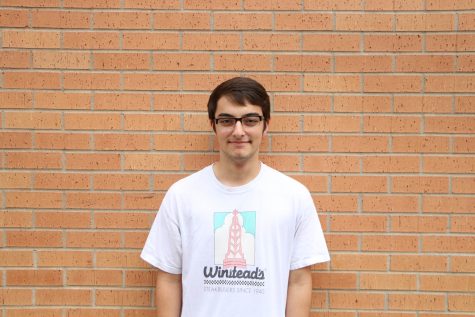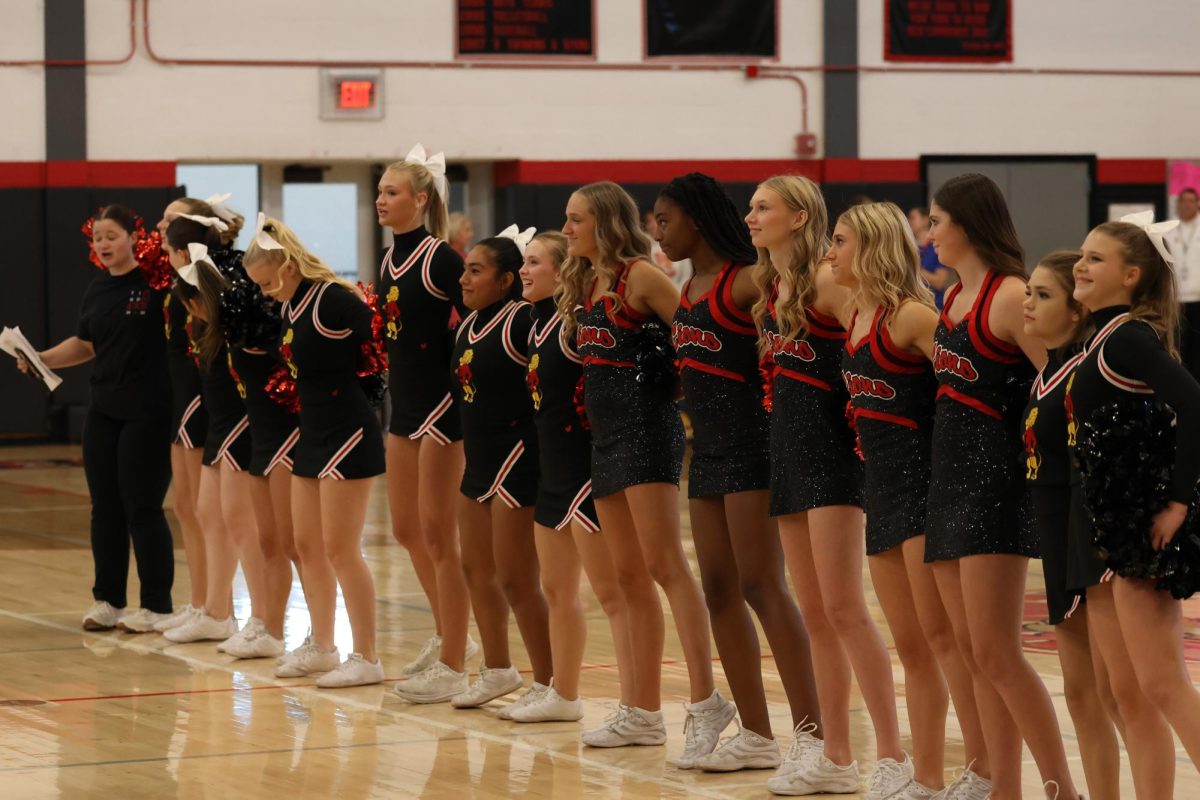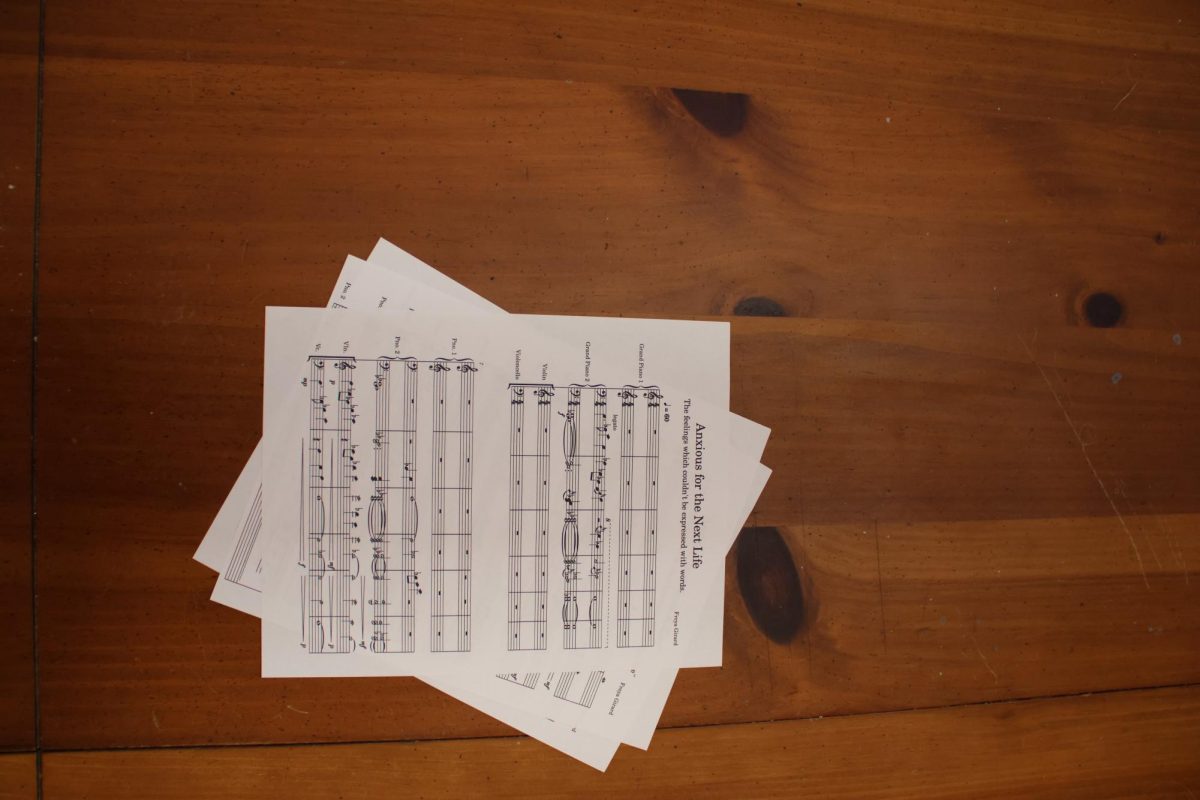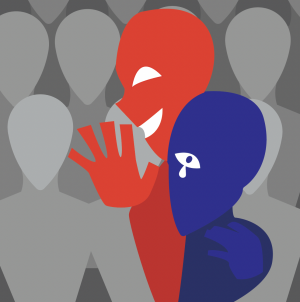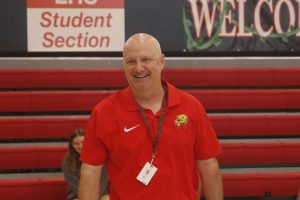Vandalism prompts talks of courageous conversation
Overnight vandalism goes too far and sparks conversations about race, class
October 15, 2014

A single can of shaving cream left behind in the football stadium marks the tool used by vandals before the LHS v. FSHS football game.
The day after the N-word was sprayed on the football field with shaving cream, superintendent Rick Doll stood midfield and declared that issues of race must be addressed in USD 497 classrooms.
The tool he cited for doing so were Courageous Conversations. Yet, many students remain unaware of the program and teachers give the training mixed reviews as it slowly rolls out to the district.
Courageous Conversations is a program run by the Pacific Education Group that attempts to combat racial injustice in educational systems. It is designed to take on issues such as the vandalism that occurred on the Lawrence High football field last month.
“I see this as an opportunity to continue to educate our students and our school community and to take deliberate actions to ensure it doesn’t happen again,” Doll said in his speech.
In an interview, Doll explained how troubled he was with both the racist remarks as well as “some classiest remarks implying ‘we’re better because we’re richer’ elitism.” Messages also referred to LHS students as “poor” and cited an old, lower graduation statistic.
“My vow was not to sweep that under the rug,” Doll said. “Our goal is that teachers can use the protocol and the conditions to have conversations with our students. The only way that we can stop it is we have kids pointing out to other kids that it’s not appropriate. We need to have the space for kids to have these conversations and use it as a learning experience.”
The Courageous Conversation program operates across the nation, as well as in USD 497.
Courageous Conversations are designed to talk about issues such as graduation rate and suspension disparities. Talking about the issues brings attention to the fact that disparities exist. In principle, addressing the problem brings the district one step closer to solving it.
The program has been in the district for the past five or six years. In that time span, more than 250 teachers, administrators and other faculty have been taught how to explore their own views on race. In addition, some have gone through the next phase of training to learn how to lead discussions.
During the next two to three years, nearly all the teachers in the district are to have gone through the training. In addition, two district employees will be trained to teach the program.
The ultimate goal is to get teachers to feel comfortable and know how to have conversations with students about relevant and serious issues regarding anything from race to gender identity.
But when the field was vandalized with a racial slur, many wondered if the PEG program was worth the time and money. At Lawrence High School, no formal messages went out to students during the school day. The first time it was publicly discussed was during the football game.
Free State handled the situation a little differently. The incident was acknowledged in an announcement by the principal at the end of the school day. Hundreds of students attended an assembly the next week to discuss the vandalism.
The first formal opportunity to discuss the vandalism for LHS students came last Tuesday when the Can We Talk programs at both schools collaborated to hold a forum at the public library. Doll said school administrators had leeway on how to respond.
“It took us a little while at the district level to figure out what we were going to do, but that does not necessarily have an effect at the school level,” Doll said. “When that happens, you need to go directly to the equity team and the administration and say, ‘We need some information.’ ”
Not even LHS faculty were formally addressed about the vandalism until a full week after the incident. Woodshop teacher Jay Hundley said that he does not recall receiving an email or any sort of official word about the vandalism.
“There wasn’t much of an effort to let us as a staff know…what the facts were,” he said.
Because of the lack of information, many teachers felt unprepared to discuss the topic in their classrooms.
“If I had known there was more to it than what we already believed, then yeah, that may have possibly made me want to address it with my students,” Hundley said.
Doll said schools could discuss the issue and would be required to form some response. In many cases, he said it’s natural that people would struggle to discuss equity issues.
“Courageous Conversation work is about protocol, how people engage in conversations about race, gender identity issues, or poverty issues,” Doll said. “Generally those are really sensitive topics. It’s really hard for people to talk about race.”
Hundley said that the Courageous Conversations program provides a foundation for teachers to begin those discussions, even if each faculty member isn’t entirely through the training.
“You’re not going to make presenters out of all of us,” Hundley said. “We aren’t always going to say the exact right thing when we talk to students, we’re human. We all have our different baggage and our different experiences coming into this. It just gives you a framework of how you should approach it.”
Although most students didn’t see Courageous Conversations play out in school, Doll said the program is having an impact. He said gains can be seen in improved graduation rates although a persistent gap remains. Like in much of the nation, he said students of color tend to get suspended more often, although he said the district has made significant gains and has policies that support improvement in that area.
This year alone, $85,000 will be spent on training for Courageous Conversations. Some question if it is worth the cost.
Doll acknowledges a lot of work remains.
“As long as we can see differences in graduation rates, as long as we can predict those rates based on the color of a child’s skin or their socioeconomic status or gender identity, our work is not done,” Doll said.
Equity teams have also been implemented to look at race issues in schools. Both high schools, all middle schools and some elementary schools have equity teams. The team at Lawrence High is composed of teachers and staff members from each department.
“The role of the equity team is to help staff have uncomfortable conversations about equity and the fact that there is an education gap between students of color and white students and to try to address ways to teach all of our students effectively,” social worker Lyneisha Thomas said.
Assistant principal Mike Norris said the school would be looking to the equity team program as they moved forward.
“I don’t know what the easy answer to this is,” Norris said in the days after a second act of vandalism — that time to a school bus. “It makes you wonder if it’s just a couple of kids being dumb or if it is a schematic of something bigger. Something that our community needs to deal with. I don’t know which it is. One of things we are doing is trying to figure that out.”
For now, the Courageous Conversations program has received mixed reviews from teachers.
“Courageous Conversations is working, although we have a lot of work to do,” social studies teacher Valerie Schrag said. “There is always work to do when it is called Courageous Conversations. It’s a long process and a hard process.”
Unfortunately, Hundley noted that the training sometimes has the effect of offending people.
“You can shut some people off who can be a positive help later on,” he said.
The responsibility for the conversations doesn’t have to fall solely on the shoulders of teachers.
“Anybody can take the initiative to start the conversation, that’s the power of these discussions” Schrag said. “It doesn’t have to come from one person or one perspective.”
The point, Doll said, is to keep talking.
“When this incident happened a couple weeks ago, we knew from day one we were going to talk about it,” Doll said. “We didn’t quite know what we were going to do about it, but we knew it needed to be talked about.”



